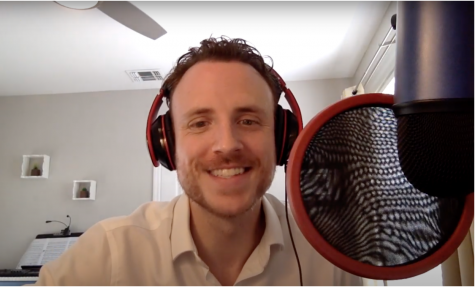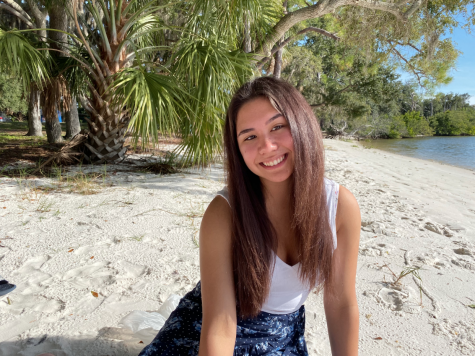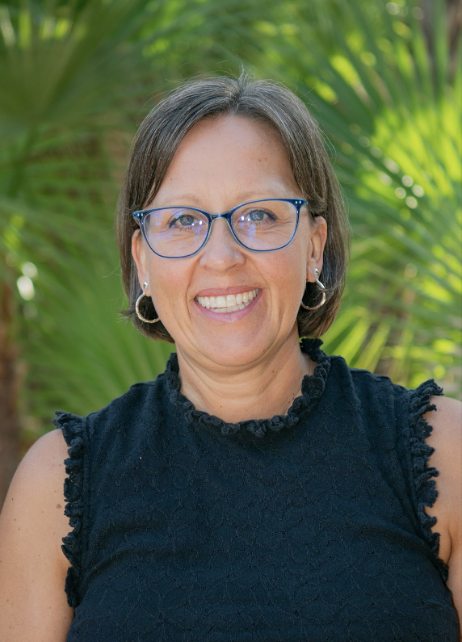Daniel Hayes on Adjusting to Online Learning
Hayes discusses the difficulties and silver linings of digital education and advises students on how to get the most out of this confusing time
April 20, 2020
With the recent switch to online learning, Berkeley faculty members are finding new ways to engage with students. This is the case for Daniel Hayes who posted YouTube videos to interact with his English 9 and AP Language Arts students over spring break. The Fanfare sat down with Hayes to learn about his experiences teaching remotely and how he is adjusting to the digital space.
Q: What are some difficulties of online learning?
A: I think a good teacher is good at reading the room. That means recognizing how people are feeling and feeding on that energy and amending lessons accordingly. I’ve had a few meetings [using Zoom], and it’s very difficult to read a room digitally. Sure, I can still see you, but it’s a digital representation of you, so it will take time to get used to.
There are these precious moments when you teach, whether it’s the collective laughter or the collective “aha!” moment when someone makes a really great point. There are still those precious moments of connection in the digital space, but I think it feels fragmented because we’re all sitting in disparate places. I’m having to find those connections in different ways. It’s more difficult to read nonverbal cues, as there’s not that three-dimensional experience like an in-person classroom setting where I can directly address one person for a moment. It’s more difficult to navigate in this space.
Q: How are you choosing to approach this unique situation?
A: I’m framing this switch to the digital world as an adventure. Our situation is so different and historically unique. I won’t pretend things are perfect, but there are a curiosity and a sense of adventure. I’m trying to soak it all in because there’s an important narrative that will come from this, and we will tell other people what wisdom we gleaned from this strange time.
I have a podcast called the Third Space Podcast. The concept is that fascinating conversations transcend the physical environment. Like, when my friend and I would talk on the phone, if I’m in the kitchen and he’s on a walk, I’m not thinking about my kitchen or his walk; we disappear, so to speak, from our current surroundings and enter this third space. This third space notion is applicable to our distance learning situation. When we come together we are in some singular space, but we immediately exit that space when we hang up. The familiarity of home is difficult to escape psychologically, as the entrenched mentality of how you operate from home is always looming in the background. However, I believe many people crave that third space, that ability to escape to the realm of fascinating thought.
Q: How did you come up with the idea to start your YouTube channel over spring break?
A: I was wondering what I could offer my students during a really stressful time. I think the answer is to help them destress a little bit, and I’m not afraid to make a fool of myself if it makes someone smile. To be honest, videoing myself really puts me outside of my comfort zone, plus I didn’t know how to do it. I needed to practice and I needed to get used to it. I needed to show students to not lose their sense of humor through all of this because, if you do, life’s going to be really rough. It also gave me a fun and different way to interact with my students while we’re all cooped up in our houses. If I’m going to ask my students to be comfortable in the digital space, I might as well do it myself. Besides, when I only think about myself is when I start to go crazy, so I wanted to channel my energy toward reaching out to others.
My videos are silly and they are not deeply personal, but I’m still allowing myself to be more vulnerable with my students. The videos are fairly mindless, and intentionally so, as it’s just a fun way to engage with my students over spring break. Students were able to get accustomed to seeing me in this digital space, and I was able to get used to seeing myself on camera and working with online tools. I know online learning comes with frustrations, but I am also genuinely excited about it pushing myself and thinking about what opportunities might reveal themselves.
Link to Daniel Hayes’ YouTube Channel: https://www.youtube.com/channel/UCsZvbybNTtae3b_FOYXHzjA
Q: What advice do you have for adjusting to online learning and social distancing?
A: Adopt an attitude of patience and forgiveness. For yourself. For your teachers. For your siblings. For your parents. Also, I think that we need to differentiate and delineate our days. They can all feel the same when you can’t leave, so my idea was to treat Friday as a special day. On Fridays, I even have some goofy lights going on in the backgrounds and allow my students to celebrate a bit before the weekend. Last Friday, I even built a fort with my girlfriend just to celebrate and deviate from my usual routine, since my weekdays are usually pretty regimented.
I think the people who are doing the best in social isolation are the ones who are turning outward rather than inward. They are connecting with family and helping other people. The miserable people are usually talking about themselves. That’s not to say there’s no room to vent; this is a frustrating time, and it’s perfectly natural to be frustrated. But you will notice the distinct differences in people with outwardly-focused mentalities and those who turn inward. AT HOME SET UP: A screencap of Daniel Hayes’ “Life Tip” YouTube video where he advises students to turn outwards and help those around them. Photo from Daniel Hayes
AT HOME SET UP: A screencap of Daniel Hayes’ “Life Tip” YouTube video where he advises students to turn outwards and help those around them. Photo from Daniel Hayes



